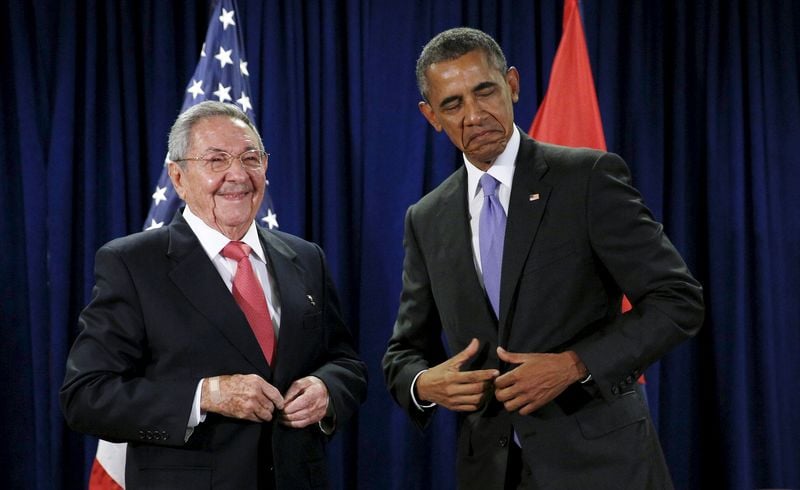
U.S. President Barack Obama and Cuban President Raul Castro adjust their jackets at the start of their meeting at the United Nations General Assembly in New York September 29, 2015. REUTERS/Kevin Lamarque TPX IMAGES OF THE DAY
Written by Matthew Barbari
During his last State of the Union address President Obama made reference to his hope that the long-standing trade embargo between the United States and Cuba would end during his last term in office. “Fifty years of isolating Cuba had failed to promote democracy, setting us back in Latin America,” the President said adding further, “Recognize that the Cold War is over. Lift the embargo.”
Obama has already begun the process of normalizing relations with Raul Castro’s government. On July 20, 2015, diplomatic ties were restored and it was announced that the Cuban embassy in Washington D.C. would be reopened, along with the American embassy in Havana. However, since the embargo still holds, it seems that it will fall upon the next U.S. President to further Obama’s legacy and end the island’s economic isolationism.
Congressional approval has been the biggest roadblock in lifting the embargo. The Republican-controlled Congress opposes the change, still perceiving Cuba as an adversary and leaving little doubt that Obama will not witness the end of the embargo before he leaves office. While many other issues have been at the forefront of the ongoing Republican and Democratic primaries, Cuba is one that each major candidates has touched upon, providing their opinion on how to handle the relationship between Washington and Havana.
Republican Candidates’ Platforms
Sen. Ted Cruz and Sen. Marco Rubio,two candidates in the Republican primary, have been particularly vocal with regard to the embargo. Both Cruz and Rubio are of Cuban dissent and both have publicly denounced President Obama’s policy of normalization, calling for an end to the embargo. Cruz has called Obama’s policy a “tragic mistake,” arguing that it gives legitimacy to the Castro regime.
Cruz believes that opening trade with the island will harm Cubans that aspire for more freedoms by allowing the communist regime in Cuba to stay to place. This sentiment is shared by Rubio, a senator from Florida, the state with the largest Cuban American population. Rubio has long been a critic of the Castro regime, judging Obama’s policy towards Cuba dangerous.
For him, lifting the embargo “threatens America’s moral standing in the region.” He has also stated that if he were elected president that he would close both embassies in Washington D.C. and Havana and would instead tighten sanctions against Cuba until the Castro regime was overthrown. This puts him at odds even with Cruz who advocates for a gradual reduction of sanctions against Cuba conditional on the improvement of their human rights record.
Democratic Candidates’ Platforms
While Republicans tend to support the embargo, many Democrats have sided with Obama, viewing the embargo has a diplomatic failure and call for the relations with Cuba to be normalized. Sen. Bernie Sanders has publicly stated that he is against the embargo and for normalizing relations, while leaving the future of Cuba up to the Cuban people. He hopes that the island will eventually become a democracy and has a track record in Congress of voting for pro-Cuban legislation. In 2015, Sanders co-sponsored a bill presented to the Senate that would allow travel between the U.S. and Cuba.
The Democratic front-runner is former Secretary of State and New York Senator Hillary Clinton. Clinton has stated publicly that she too supports Obama’s call to normalize relations, despite her past record being in favor of the sanctions. She has stated recently that the embargo is an “albatross”on the U.S. in its maneuvering in Latin America and that American foreign policy no longer needs to be viewed “through an outdated Cold War lens.”
Clinton has also taken the stance that if elected she would push Congress to lift the embargo or use her executive power to reduce travel restrictions and increase trade. She claims that during her time as Secretary of State, she asked Obama to consider ending the embargo. However, the process of normalization only began after her time as Secretary ended.
Clinton has had to defend her current position on Cuba as it contradicts her past record, having supported the embargo during her 2008 presidential campaign. Even during her time as First Lady under President Bill Clinton, she was in favor of measures to strengthen the embargo such as the Helms-Burton Act of 1996. While Clinton is allowed to change her mind about policy issues, it raises the question whether she truly supports such policies or is looking to please her pro-normalization voting base in the bid for the Democratic nomination.
Regardless of candidates’ stances on the Cuba embargo, little will happen as long as Congress remains opposed to ending it. With Raul Castro set to step down in 2018, the coming years will be crucial in Cuban history. Whether we want the U.S. to be a part of it is ultimately up to us.